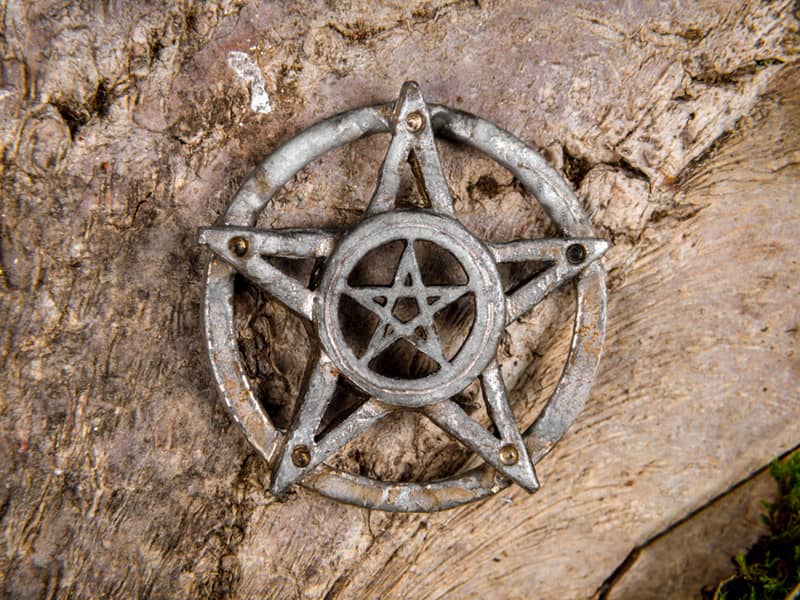A spirited teenager visiting the camp and the Southwest for the first time, she appears as if there are a thousand things she would rather be doing than stamping clay under the hot New Mexico sun more than one thousand miles from home. Five days later, Joanne stoops down and affectionately places her hands on the oven, her face glowing with pride. "By helping to build this oven," she says as she prepares to leave camp, "I left part of myself here. I can say, I did that. I helped to build an adobe oven!"
Her response is typical of the campers who have participated in the experiential education summer program at Sacred Mountain Camp, one of many Native American programs for youth rooted in traditional Native cultures and religions. These camps are succeeding where non-Native programs have often failed: putting youth on positive life paths away from drugs and alcohol and towards education and community involvement.
Sacred Mountain camp is nestled at the base of Mt. Taylor on top of a volcanic mesa surrounded by lush pine forests near the Acoma and Laguna Peublos of New Mexico. Here the campers are far removed from the distractions and modern conveniences of the 20th century. Here they learn to appreciate Native customs and traditions, to challenge themselves in outdoor activities that teach lessons about teamwork and trust.
There are approximately 40 young people from various tribal groups attending camp this year. Sacred Mountain Camp is a program created and operated by the National Indian Youth Leadership Project, a distinguished Native American educational program which has received national honors for its pioneering work on behalf of Native American youth. It's emphasis is on positive reinforcement of traditional Native values through indirect teaching, instructing through metaphor and support. The full-time staff of educators are Native American. They teach cooperation rather than competition and encourage each camper to do his own "personal best," whether strapped in a safety harness on the ropes course high above the earth, or hiking through a basin rich in wildlife.
"Our elders taught us that the way to fight negativity is not through talking about it," says Mr. Hall. That is why in my opinion so many of the drug prevention programs have failed. The way to help young people, according to our ancestors, is by stressing the positive, identifying positive ways in which young people can live their lives to be in balance and harmony with nature, sharing their talents and skills with the community to improve life for everyone."
The instructors, Native American educators, take every opportunity to teach through metaphor the value of community. The youth learn through doing, cooperation is valued over competition. The young people are separated into clan groups when they arrive, and the clan groups offer the emotional and physical support during the various activities.
"Sam" gets caught on the ropes and falls off, caught by his safety harness. He has to pull himself up. The instructor uses the experience as a lesson: "Just like 'Sam' has his clan," the instructor says, "you always have your community to depend upon, your language, your customs, your ceremonies. Like your clan members here today, they won't let you down."
The rustic outdoor setting, (forget radios, TVs or boom boxes), is also cited as being integral to the success of the camp. The young people camp with their clans, their adult clan leaders camping with them. "Camps are a time out of time," explains Alejandro Lopez, education specialist for the NIYLP. "In ordinary society, we are ruled by the clock. The schools have a certain amount of authority as does the commercial dominant society. Here none of that exists. Here, we are able to see what it means to be an essential human being, to get to know ourselves and others who share the experience with us."
The days may be long and the work is hard, but the sound most often heard at Sacred Mountain Camp is laughter. This is particularly true during the nightly gatherings at the amphitheatre called the Turtle for its shape, conceived of by Mr. Hall and based on Native American customs and beliefs.
"You can really see us come together during the evening hours," says Alejandro Lopez. Our shared laughter and learning become the mortor which seals us together to act as a community, rather than as a gathering of strangers."
The camp's success is underscored by the return of former campers who volunteer to return as junior staff. "I would have been a couch potato if it wasn't for this camp," reports one junior counselor. "I returned to give the kind of support I received. To let these kids know that someone cares and knows what they are going through and wants them to succeed."
Mr. Hall believes this kind of positive prevention education can work for non-Native communities too, and he is currently working as a consultant to organizations impressed by his record of success. "What we do is plant seeds. It might not be today or tomorrow, but what we have to tell them will make an impact. I think we planted some seeds this year at camp, and we can be proud of that."

